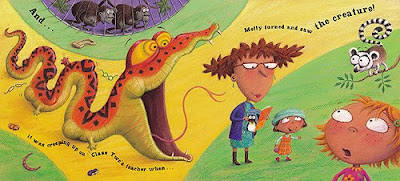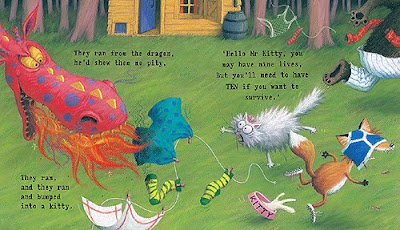


Stock illustrations.
Sevensheaven images and prints are for sale at sevensheaven.nl
Viewing: Blog Posts Tagged with: scanning, Most Recent at Top [Help]
Results 1 - 6 of 6
Blog: Sugar Frosted Goodness (Login to Add to MyJacketFlap)
JacketFlap tags: conversion, illustration, metin seven, sevensheaven, scanner, windows, hands, scanning, laptop, screenprint, document, Add a tag
Blog: An Illustrator's Life For Me! (Login to Add to MyJacketFlap)
JacketFlap tags: illustration, writing, editorial, scanning, Class Two at the Zoo, Dragon's Dinner, scans, Add a tag
I finished my article and I'm rather pleased with it - let's hope they are!

Except... as the article is aimed at writers, I want to show how I've interpreted the text, so I need the story to appear on the illustrations, as in the actual books. Even more so with the image above from Class Two at the Zoo: an example to demonstrate how a more adventurous designer might incorporate text (great job Claire!).
But the words are obviously not on the original scans, and scanning the printed page gives poor quality illustrations. So to get the images you see here, I've had to fiddle about, scanning the books, then lifting off the text in Photoshop and pasting it on top of my original illustration scans: a bit of a pain.

Blog: An Illustrator's Life For Me! (Login to Add to MyJacketFlap)
JacketFlap tags: artwork, scanning, Designer, Bears on the Stairs, digital, Add a tag
 Our 3 furry friends arrived safely at Andersen Press (phew) and everyone is really pleased (double phew).
Our 3 furry friends arrived safely at Andersen Press (phew) and everyone is really pleased (double phew). Andersen will get sent these the minute they're done, ready for the designer to do page layouts, and for me to do the digital finishing work.
My problem is that I am booked solid with school visits until well after the Fair. My only window of opportunity is one free weekend, squeezed between my travels when, instead of a well-earned bit of feet-up, I'll have to set to on those scans.
Blog: librarian.net (Login to Add to MyJacketFlap)
JacketFlap tags: digitzation, scanning, internetarchive, amygoodman, democracynow, books, googlebooks, google, Add a tag
I was lucky enough to catch Brewster Kahle talking with Amy Goodman on Democracy Now on my drive home from NJLA. I feel like I’m pretty up on what’s going on with Google and the Internet Archive and book scanning. What I didn’t know is how Google’s agreements with libraries are hindering the IA’s access, not because of the contracts, but just because of differing priorities. The video and transcript are now available online.
AMY GOODMAN: Explain what you mean when you say it’s not legally required. You mean in the contract, what they have with Google? And so, if Google was here, they’d say, “We didn’t say they couldn’t give it to Internet Archive. That’s their prerogative.”
BREWSTER KAHLE: Correct, that basically Google didn’t put it in their contract. Yet from a library’s perspective, why have a book scanned twice? It’s wear and tear on the books. If they think that—and they wouldn’t have signed it if they didn’t think that the Google thing was a good idea. But now that they’ve signed this with Google, they don’t want it scanned again. And this is a problem, because the books, even the out-of-copyright books, are locked up perpetually.
Blog: librarian.net (Login to Add to MyJacketFlap)
JacketFlap tags: books, blogz, diy, howto, scanning, Add a tag
You can make your own fancy-pants book scanners from trash and cheap cameras, instructables shows you how in just 79 easy steps! [thanks nick]
Blog: librarian.net (Login to Add to MyJacketFlap)
JacketFlap tags: books, digitization, googlebooks, harvard, scanning, Add a tag
In light of the recent Google Books/APA settlement, Harvard has examined the details and decided not to be part of the project after all.
Harvard’s university-library director, Robert C. Darnton, wrote in a letter to the library staff, “the settlement provides no assurance that the prices charged for access will be reasonable, especially since the subscription services will have no real competitors [and] the scope of access to the digitized books is in various ways both limited and uncertain.” He also expressed concern about the quality of the scanned books, which “in many cases will be missing photographs, illustrations, and other pictorial works, which will reduce their utility for research.”
Update: According to the comments, I had this sort of wrong. Harvard is deciding to not have Google scan their copyrighted books but the digitzation project proceeds apace. Thanks Jon.



my sons love class 2 at the zoo, its a firm fave in our house lol
That's great! Ssssssay hello to them from me x